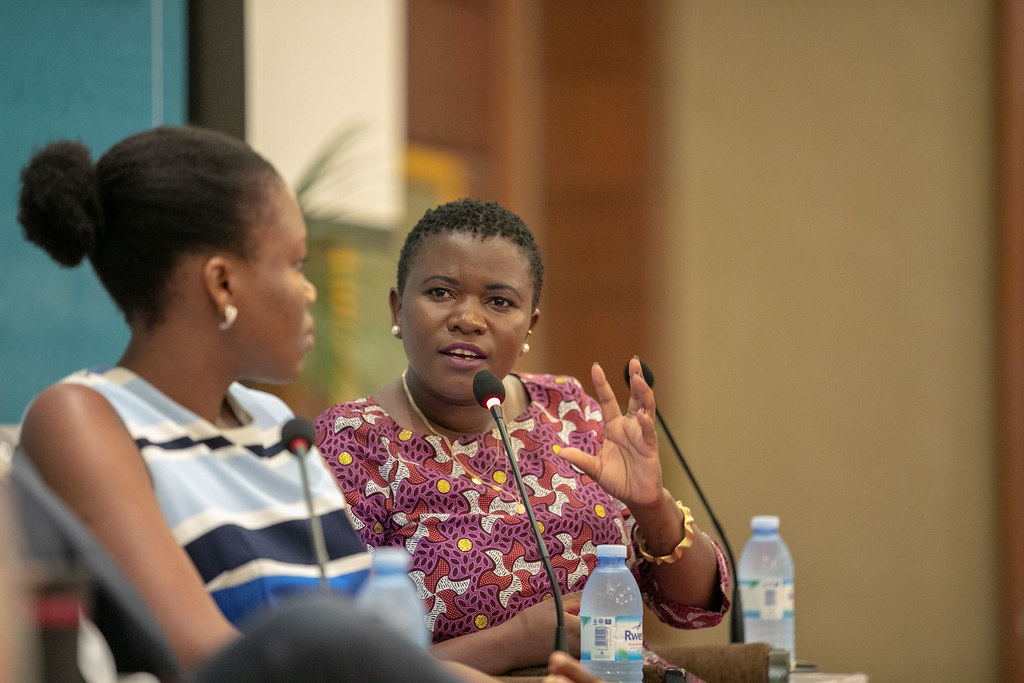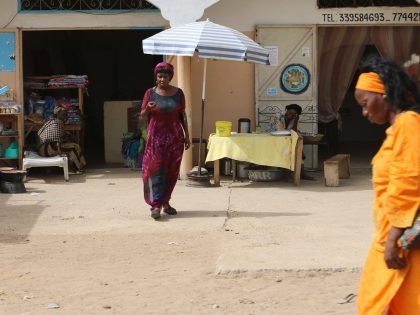Feminist organizing on digital platforms
The coverage of African women in the mainstream media continues to be lacking and often times problematic. The website, African Feminism, wants to change that.

Rosebell Kagumire (in focus). Image via Chapter Four Uganda Flickr CC.
- Interview by
- Rama Salla Dieng
Below is a conversation with Rosebell Kagumire, a writer, award-winning blogger, pan-African feminist, socio-political analyst, and the curator and editor of the African Feminism website.
Hello Rosebell, please tell us who you are, and what led you to your activist work?
I am a Ugandan journalist and rights defender. I came to my activism work through my journalism, traveling across Uganda and experiencing various inequalities and issues that persisted among everyday Ugandans. I worked on stories on justice after the Lord’s Resistance Army (LRA) war in northern Uganda, the peace talks between the LRA and government, covered stories from health to political prisoners before going into my masters. That’s what informed my expanded view of struggle, and understanding that our struggles are linked. This extended to various oppressions we face as women, as a country or as a continent.
You worked in multimedia communication and blogging before, what lessons did you learn from that experience?
I have always been opinionated even as a child. I was always curious and learning beyond the limits. So while working as a journalist I noticed earlier in my career that my voice was not that present in the mainstream way of covering stories. I always felt I had a story, an observation, a question that would not end up in the paper or in a TV story. Therefore, I started to blog as a way to make my own stances, share lessons, journeys out of various trips, encounters and experiences. It was from documenting my own thoughts that led me to really learn more about the issues I was covering and why the situation was the way it is beyond official explanations. I was able to learn more from people that have long theorized issues that I was trying to understand or thought I understood.
What is the African Feminism website?
It’s a collaborative platform of African feminist writers who document their own journeys and experiences of women in their communities, countries. To be able to share them on the same platform, we learn from each other and about each other. The coverage of African women in the mainstream media continues to be lacking and often problematic. Most Africans still learn about the other parts of the continent through information produced via western media. We thought this would be a platform aided by social media for us to understand our collective struggles and achievements as African women on the continent and in the diaspora. We welcome feminist writing from all women on the continent, and especially shedding light on those issues we would not usually see represented in the mainstream. We also notice that we have great African feminist academic work but we still lack the bridges to bring it down to ordinary women and girls, to relate their experiences to the larger systems in which we live.
African Feminism was created as a “a pan-African feminists digital platform and collaborative writing project between African authors/writers with the long-term ambition of bringing on board at least one feminist voice from each country on the continent.” How achievable is a pan-African feminist agenda, with digital platforms being potential, as Dr. Cornells West said, “weapons of mass distraction”?
Digital platforms are not inherently good or bad, they come into a world that already has its own politics, its own marginalization and its own violence. This is what plays out often online, but we have seen many groups use the platforms to bring out perspectives long marginalized and silenced. Young women are increasingly exerting pressure on societies that never guaranteed their grandmothers and mothers certain rights and the online world has helped give them a collective sense that you are here, you are human enough, rights should not be cordoned off or be a preserve of certain groups based on their gender, location, race, or sexuality. Our own dominant popular histories erase women’s work, women’s brilliance, and achievements, with the digital we can, in real time, seek out the stories both past and present and take part in writing our herstories. We see being connected, for grandchildren of women whose public lives and voices were limited, as a new opportunity to take on the world in ways that were not possible for our ancestors. We do so even at great personal labor and risk as we continue battling the violence that the internet has enabled and aggravated. Technology has enabled the kind of connectedness that also redefines the ideas of belonging and kinship.
In the age of “clicktivism,” how can we overcome the digital divide and harness the potential of social media as “digital spaces of contention” which can allow us articulate emancipatory strategies to resist various forms of oppressions, organize and mobilize as in the case of Stella Nyanzi or Shailja Patel?
We must not stop at online presence, we must meet, we must emote in person, we must mobilize together offline too. We must be able to visit Dr. Stella Nyanzi in jail or show up for solidarity in court. We can’t only remain as online figures. We can use these spaces to know each other and support each other beyond the click. We have an opportunity to express ourselves, mobilize online but we must be aware of the inequalities of the societies we live in. Therefore our fight must be constantly expanded, for those whose voices are yet to be heard. The income and gender digital divides are real, so it is only through the physical world in which we can truly enrich and educate ourselves of realities of those whose lives we don’t live. Acting both as bridges to bring those lessons to those already privileged to be online, as well as open new doors and new possibilities for those still unheard.
How do you reconcile your work with African Feminism with your other activities?
Working as curator and the editor for the platform is mostly volunteer work, and it’s the same for the writers. We seek paid jobs and opportunities outside the platform. Personally, I write for various media outlets, and train others on media and its intersection with the greater society.
If you were to cite three life lessons that you learned from interviewing African feminists, what would those be?
That I do not know that much. I have to remain open to difference and be made uncomfortable in order to learn. I must strive to go beyond acceptance of the other. I have the duty to embrace and understand other lives and perspectives, that’s how you can effectively tell stories. Strive to confront any form of bigotry and hate within me because we are socialized in and by various systems. I guess that’s more than three.
Which feminist books are you reading at the moment and what are your thoughts on it?
I am currently still reading Nanjala Nyabola’s Digital Democracy, Analogue Politics: How the Internet Era is Transforming Politics in Kenya. There’s just so much to take in in terms of how the digital world is shaping and not shaping our lives. And the feminists in Kenya give me joy. I am reading something else, not feminist but something as a feminist I find imperative Human Archipelago by writer Teju Cole and photographer Fazal Sheikh. A collection of photos with Teju’s writing, it is just too moving on displacement, home and kinship. How the world omits historically marginalized peoples as humans worth our hospitality. In these cruel times against migrants, it is an important voice.
How do you live a feminist life?
A feminist life is one that requires self-reflection, knowing your privilege and constantly trying to make room for others to come to the table, whichever I am able to access. Beyond just identifying oneself as feminist, for me it is important to ask questions about justice and fairness in my everyday work and life. It is not easy to achieve this in all societies because we live in systems where you are victim one moment and perpetrator in another. It’s important to remember one’s privilege and power in the different circumstances and work to break the chains that might still holder others. The aim is to eliminate privileges and have more rights for everyone. I try everyday to identify struggles I can contribute to, from family to the larger society.
What acts of radical self-care do you practice?
Take time to sleep—I get over 10-hours of rest. I travel, spend time with friends, read books. Must say, I need to do more self-care, especially learning to say no in terms of how much work I take on.



